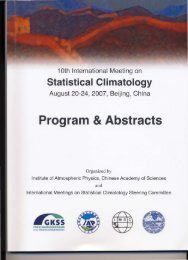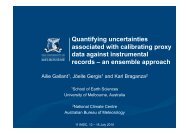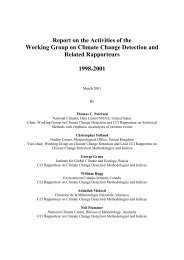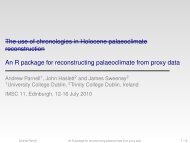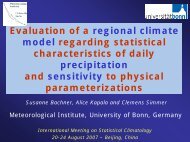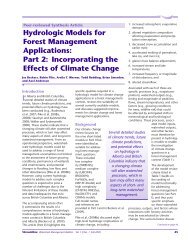The tenth IMSC, Beijing, China, 2007 - International Meetings on ...
The tenth IMSC, Beijing, China, 2007 - International Meetings on ...
The tenth IMSC, Beijing, China, 2007 - International Meetings on ...
Create successful ePaper yourself
Turn your PDF publications into a flip-book with our unique Google optimized e-Paper software.
<str<strong>on</strong>g>The</str<strong>on</strong>g> ranked probability score and its corresp<strong>on</strong>ding skill score are widely used metrics<br />
of the quality of forecasts of weather and climate that are expressed as probabilities of three or<br />
more ordinal categories.<str<strong>on</strong>g>The</str<strong>on</strong>g> ranked probability score c<strong>on</strong>siders the ordering of the categories<br />
so that for two forecasts with equal probabilities assigned to the observed category, a better<br />
score will be achieved by the forecast that gives higher probabilities to nearby categories. It is<br />
argued here that when c<strong>on</strong>sidering the mathematical quality of forecasts as opposed to their<br />
social or ec<strong>on</strong>omic value, the credit given to probabilities assigned to categories close to the<br />
observed category ('distance') is an undesirable feature of the ranked probability score<br />
because we have no knowledge of what the actual probabilities are for these categories for<br />
any specific case. <str<strong>on</strong>g>The</str<strong>on</strong>g> reliability of the probabilities assigned to the categories that did not<br />
verify can be tested <strong>on</strong>ly over a set of forecasts by c<strong>on</strong>sidering the observed relative<br />
frequencies of verificati<strong>on</strong>s within these categories c<strong>on</strong>diti<strong>on</strong>al up<strong>on</strong> the forecast probabilities<br />
assigned.It is thus inappropriate to give credit for 'near-misses' in the c<strong>on</strong>text of probabilistic<br />
forecasts. A desirable feature of a scoring metric is that of 'locality': the forecast is scored <strong>on</strong>ly<br />
<strong>on</strong> the basis of the probability assigned to what actually occurred. <str<strong>on</strong>g>The</str<strong>on</strong>g> ranked probability score<br />
does not have this feature. Alternative scores include the quadratic and the logarithmic scores,<br />
but the latter is to be preferred since the former does not generalise to c<strong>on</strong>tinuous forecasts<br />
(infinite number of categories).<br />
Verificati<strong>on</strong> of Seas<strong>on</strong>al to Secular Climate Forecasts<br />
Speaker: David Stephens<strong>on</strong><br />
Professor David Stephens<strong>on</strong><br />
University of Exeter, UK<br />
Verificati<strong>on</strong> is a key aspect in developing good scientific forecast systems. Without<br />
reliable procedures for forecast evaluati<strong>on</strong>, we are unable to judge whether a forecasting<br />
system is better than just chance or whether a new forecasting system is really an<br />
improvement compared to previous schemes.<br />
Climate forecasts pose particular problems for forecast verificati<strong>on</strong>. Small sample sizes and<br />
n<strong>on</strong>-stati<strong>on</strong>arity due to l<strong>on</strong>g-term trends can make verificati<strong>on</strong> scores extremely unreliable and<br />
uninformative and put serious limits <strong>on</strong> how well we can assess such types of forecast.<br />
This talk will discuss various issues that affect the verificati<strong>on</strong> of climate forecasts and will<br />
present simple statistical models for understanding verificati<strong>on</strong> of climate forecasts <strong>on</strong><br />
lead-times from seas<strong>on</strong>s to centuries<br />
104




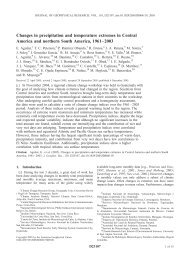
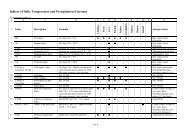
![final_program_abstracts[1]](https://img.yumpu.com/19102520/1/174x260/final-program-abstracts1.jpg?quality=85)
